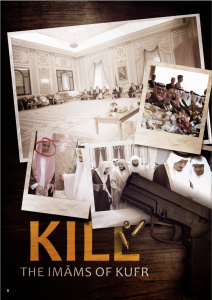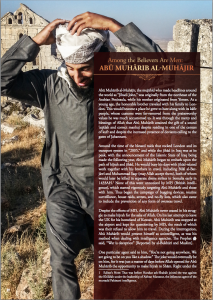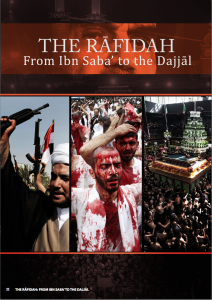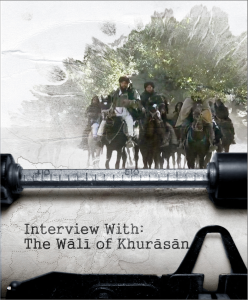The newly released 13th issue of the Islamic State’s English-language Dabiq magazine begins with an article praising the Dec. 2 terrorist attack in San Bernardino, California. Abu Bakr al Baghdadi’s propagandists note that the husband and wife responsible for the massacre “not only” left “behind their comfortable lifestyle,” but also “left their baby daughter in the care of others knowing that they likely wouldn’t see her again in this life.”
The “caliphate” wants more Muslims to follow in the couple’s footsteps: “May Allah accept the sacrifices of our noble brother Syed Rizwan Farook and his blessed wife, accept them among the shuhadā’ [martyrs], and use their deeds as a means to awaken more Muslims in America, Europe, and Australia.”
However, most of the publication is devoted to other matters. The cover story is a lengthy denunciation of the “The Rafidah,” or rejectionists, a derogatory term used by Sunni jihadists to describe Shiites.
And, as in past issues of Dabiq, the Islamic State repeatedly criticizes al Qaeda and the Taliban. Even the cover article is used to denounce Ayman al Zawahiri for supposedly being soft on Shiites.
Indeed, the “caliphate” is clearly obsessed with its jihadist rivals.
Saudi Arabia’s “palace scholars”
The Islamic State and al Qaeda both denounced Saudi Arabia’s mass execution of more than 40 men in early January. Many of the men sentenced to death took part in al Qaeda’s attempt to destabilize the Saudi kingdom from 2003 to 2006. But the authors of Dabiq argue al Qaeda’s response to the Saudi executions was lacking.
Zawahiri “came out and criticized the apostate Saudi regime but made no mention of the evil scholars backing them,” Dabiq’s authors argue. Instead, Zawahiri “merely advised the ‘scholars’ of the Arabian Peninsula to speak out against the government.”
The “caliphate” urges its supporters to outdo al Qaeda and attack the Saudi clerical establishment. It “was already obligatory to spill the blood of these palace scholars,” Dabiq’s authors write, “for they had apostatized years ago, defending and supporting” those who wage “war against Islam.” After the mass execution, “the reason to kill them now is even greater.”
The jihadists who produce Dabiq ask: “When then will the Muslims of the Arabian Peninsula wake up and act out against the apostasy of these palace scholars?” They then answer their own question: “Indeed, these ‘scholars’ have broken their oaths with Allah and with the Muslims, just as they have targeted the religion with their lies and instigation against the people of jihad and piety.”
“Jihadi John”
Dabiq confirms that the terrorist known as “Jihadi John,” who became infamous for beheading several victims on camera, was killed in a US airstrike in November 2015. The executioner’s real name was Mohammed Emwazi, but the Islamic State refers to him as “Abu Muharib al Muhajir.” Dabiq provides a short biography of his career.
Emwazi started down the jihadist path “[a]round the time” of al Qaeda’s July 7, 2005 bombings in London. He began to work with Bilal al Berjawi and Muhammad Saqr, two members of Shabaab, an official branch of al Qaeda. Both Berjawi and Saqr were killed in US drone strikes. Berjawi was a British citizen of Lebanese descent who served under some of al Qaeda’s most senior personnel in East Africa.
Baghdadi’s men are sensitive to the rivalry with al Qaeda even in telling Emwazi’s story. For instance, a footnote in Dabiq informs readers that Emwazi’s work with Berjawi and Saqr took place “before” Shabaab “joined the war against the Khilāfah [caliphate] under the leadership of Akhtar Mansour, the infamous agent of the murtadd Pakistani intelligence.”
Dabiq’s authors are referring to Shabaab’s crackdown on defectors who attempt to join Baghdadi’s group or one of its “provinces.” Akhtar Mansour (or Mullah Akhtar Mohammad Mansour) is the head of the Taliban. Last August, Zawahiri swore allegiance to Mansour on behalf of himself and all of the jihadists under his command, including those fighting in al Qaeda’s regional branches, such as Shabaab. The Islamic State frequently accuses Mansour and the Taliban of being agents of Pakistani intelligence.
The jihadists who produced Dabiq taunt Britain’s MI5, claiming Emwazi managed to make his way to Syria in 2012 despite the security service’s attempts to stop him. Here, too, Emwazi’s story contains an al Qaeda-related twist. The Islamic State reports that he joined Al Nusrah Front at a time when it was “operating” as an arm of Baghdadi’s Islamic State. In 2013, a rift between Abu Muhammad al Julani (who leads Al Nusrah) and Baghdadi became public. Julani refused Baghdadi’s attempt to command Al Nusrah and instead reaffirmed his allegiance directly to Ayman al Zawahiri. This leadership dispute evolved into a global competition between al Qaeda and the Islamic State that has raged ever since.
The Islamic State says that Emwazi joined Al Nusrah “prior to [Julani’s] treachery” and before Julani’s “betrayal and nullification of his bay’ah [oath of allegiance]” to Baghdadi. Emwazi did not follow Julani. Instead, he was supposedly “among the very first to declare his disavowal of” Julani. Emwazi also purportedly warned that Julani was going to become “another Shaykh Sharif [Ahmed],” a reference to the former head of the Islamic Courts Union (ICU) in Somalia. Baghdadi’s jihadists accuse “Shaykh Sharif” of betraying the jihadists’ cause. Shabaab grew out of the ICU and eventually became a wing of al Qaeda.
The authors of Dabiq are, therefore, extremely sensitive to the role al Qaeda played in Emwazi’s career. They attempt to distance him from Shabaab and Al Nusrah, both of which remain loyal to Zawahiri to this day. In recounting Emwazi’s involvement in Syria’s battles, the Islamic State says he fought in the provinces of Idlib and Raqqa.
“He also participated in the fighting against the sahwāt of Shām and was injured within the first week of the Sahwah,” Dabiq’s biography for Emwazi reads. The biographer adds that Emwazi sustained “a gunshot wound to his back during the battle to retake Huraytān.” Sahwāt, or sahwa, is a reference to the “awakenings.” This term was once used to describe the tribal forces that rose up against the Islamic State’s predecessor, al Qaeda in Iraq (AQI) and the Islamic State of Iraq (a political front for AQI). But the Islamic State has come to use it to describe many of the “caliphate’s” opponents, including its jihadist rivals.
Incredibly, Dabiq tries to emphasize Emwazi’s softer side, claiming that only those close to him knew of “his mercy, kindness, and generosity towards the believers, his protective jealousy for Islam and its people, and his affection towards the orphans.” His victims would tell a different a story.
The Shiites
Much of the 13th issue of Dabiq focuses on Shiites, portraying them as anything but the Sunni jihadists’ co-religionists. The Islamic State has deliberately targeted Shiite civilians around the globe. This is intended to be a point of contrast with al Qaeda, as Zawahiri and his subordinate commanders have ordered their fighters to refrain from targeting Shiite civilians.
In Dabiq, the Islamic State cites correspondence between Abu Musab al Zarqawi, who founded al Qaeda in Iraq, and al Qaeda’s senior leaders. Zawahiri wrote one of the letters cited in Dabiq to Zarqawi in 2005. In it, Zawahiri complained that Zarqawi’s indiscriminate targeting of Shiites was making it more difficult for al Qaeda to achieve its long-term goals.
The Islamic State uses the al Qaeda letters to highlight the Sunni jihadists’ differing opinions regarding attacks on Shiites. And Baghdadi’s men blast Zawahiri’s rulings on the matter.
Zawahiri’s “policies towards the Rāfidah are clearly based upon his deviant belief that they are ‘Muslims,'” the “caliphate’s” propagandists write. Baghdadi’s followers argue it may be true, as Zawahiri has claimed, that no Sunni Islamic state has attempted “to kill off the Rāfidah,” but this is only because the Shiites didn’t have the “political power” or “military might” that they do today. The center of this power is Iran. Therefore, according to the Islamic State, the Shiites must be targeted now.
Al Qaeda’s close ally, the Taliban, has also erred in its policies towards the Shiites, according to Dabiq’s authors. “As for the nationalist Taliban, then they are similar to [Zawahiri’s al Qaeda], considering the Rāfidah to be their brothers and [publicly] denouncing those who target the Rāfidah.” The Taliban has “boasted of their gatherings with the Rāfidī officials of Iran,” criticized UN sanctions against the Iranians, and condemned attacks on Shiites. All of these actions are deviant, according to the Islamic State.
The governor of the Khorasan “province”
Dabiq includes an interview with Shaykh Hafidh Said Khan, who is introduced as the governor (“wali”) of the Islamic State’s so-called Khorasan “province.” As is the case elsewhere around the globe, Baghdadi’s men in the Khorasan (a region that includes Afghanistan, Pakistan and parts of the surrounding nations) often battle their jihadist rivals. And Khan uses his interview to disparage both the Taliban and al Qaeda.
The “nationalist Taliban movement” seeks “to instigate various problems in order to wage war against the Khilāfah [caliphate],” Khan says. He claims that the Taliban does not rule by sharia law, but instead according to “tribal customs” and “the desires and traditions of the people.”
Khan portrays Mullah Mansour, the emir of the Taliban, as an agent of Pakistani intelligence. Mansour and “his associates have strong and deep ties with Pakistani intelligence, and they live in the most important cities of ‘Pakistan,’ such as Islamabad, Peshawar, and Quetta,” Khan says. Mansour’s shura council even “contains members from the Pakistani intelligence,” which “aids” Mansour “in everything he does.”
Khan says the relationship between the Taliban and Pakistani intelligence was made clear after Hamid Gul, who headed Pakistan’s Inter-Services Intelligence (ISI) agency in the late 1980s, passed away last year. Khan points out that Mansour heaped praise on Gul and “gave the greatest condolences over his death out of loyalty to Pakistani intelligence and in recognition of everything they’ve done for him and for his Taliban movement.”
The Islamic State’s “governor” confirms that the Taliban attacked members of the Islamic Movement of Uzbekistan (IMU) who swore allegiance to Baghdadi’s caliphate. Khan refers to these IMU jihadists as the “Uzbek mujāhid brothers” who “gave bay’ah [allegiance] to the Khalīfah with sincerity.” A “number of the Uzbek brothers were martyred and wounded because of the Taliban’s criminal assault against them, and the Taliban movement increased in its tyranny and criminality by purposely killing their defenseless women and children,” Khan alleges.
The Taliban admitted last summer that Mullah Omar passed away in 2013. Khan says he and others suspected that Omar was dead because they supposedly “began noticing changes and deviations in the disposition of the Taliban, as well as in their deeds and official statements.” He claims, for instance, that the Taliban stopped implementing sharia law in some areas.
With respect to al Qaeda, Khan makes a claim that is easily debunked. He says al Qaeda “no longer has a real presence” in the Khorasan “apart from the presence of only a few of its members.” These individuals “have no ability to fight the [Islamic State’s Khorasan province],” but spread “misconceptions” about the caliphate and incite “the people against giving bay’ah [allegiance]” to Baghdadi’s organization. Al Qaeda “has collapsed in a very big way here in its center and former stronghold.”
Al Qaeda clearly has a much more significant presence in Afghanistan than Khan wants people to believe. In September 2014, for example, Ayman al Zawahiri announced the establishment of al Qaeda in the Indian Subcontinent (AQIS), which operates in Afghanistan and throughout the region. In October 2015, the US military launched raids against two al Qaeda training facilities in southern Afghanistan. One of the two was nearly 30 square miles in size. The 6th issue of Dabiq, posted online in January 2015, even revealed additional details about al Qaeda’s significant infrastructure in the region.
Khan claims that there is “no difference” between al Qaeda and the Taliban, because Zawahiri pledged allegiance to Mansour. And they both “ultimately fall under the authority of the Pakistani intelligence.” The Islamic State continues to hammer at this theme in its propaganda, hoping that jihadists sour on the Taliban because of its ties to the Pakistani establishment.
A consistent message
The Islamic State consistently attacks the Taliban’s and al Qaeda’s jihadist credentials in Dabiq. [See, for example, LWJ reports: The Islamic State’s curious cover story and In Dabiq magazine, Islamic State complains about jihadist rivals in Libya.]
This is telling. If al Qaeda has been surpassed by Baghdadi’s organization, as many commentators assume, then why does the Islamic State spend so much ink on Zawahiri’s group? Obviously, al Qaeda is still a major thorn in the Islamic State’s side.
In fact, even as the latest issue of Dabiq was being disseminated online this week, the Islamic State made another attempt to woo al Qaeda’s fighters in North Africa and elsewhere. Baghdadi’s propagandists released a series of new messages and videos targeting jihadists in the Maghreb as part of the effort. The Islamic State’s anti-al Qaeda arguments in Dabiq and other publications are, therefore, part of a concerted campaign.












4 Comments
Recently I read a report in which the Afghan intelligence chief accused Pakistan of supporting ISIS, an allegation that needs to be thoroughly investigated.
I love when the dogs fight each other. Wait, and watch.
It is merely common sense and quite evident that IS is stronger than AQ in most theatres and threatening it. This campaign is self assured and is intended to put the final nail in AQ
Nice article. it asks the question “This is telling. If al Qaeda has been surpassed by Baghdadi’s organization, as many commentators assume, then why does the Islamic State spend so much ink on Zawahiri’s group?”
I’ll give my answer to that question in the form of a rhetorical ‘loaded ‘ question.
Why does a younger brother who makes 150K a year selling stocks, drives fast cars, has an ‘exciting life’ and always dates good looking girls, why is he jealous of his older brother the accountant who only earns 75K, married a average looking woman 15 years ago and lives a humdrum life with their two kids and dog behind a white picket fence?
Since the islamic state is an organization that will soon collapse, was doomed to fail as an overt state for any length of time despite the remonstrations of the intervention minded chicken hawks and nay-sayers, it looks to me as if they are attempting to “tear down the palisade”, to provide no place to run for the RATS in their rancid collapsed organization when the end happens as indeed is happening now and has been for the last year. The rats WILL run and WILL look for shelter. The flow of recruits from the world to IS will reverse. Those who stay will need to hide or relocate.
al qaeda has seemingly always reached out the hand to IS to reunite again (of course under the al-qaeda banner and leadership). There is NO OTHER PLACE for these rats to run to except al qaeda, who in my opinion will open the door to become the “ansar” for the ones they determine to be “right minded” or “redeemable” after IS membership.
During the Roman civil wars during the first century BC, Caesar was said to have told his troops that as they marched out of their camp towards the enemy Roman camp to tear down a part of their own palisade on the march out and to fill in the ditch so that there will be no shelter in case of defeat so that his soldiers knew that their only options were victory or death.
The islamic state is trying to fill in the ditch.